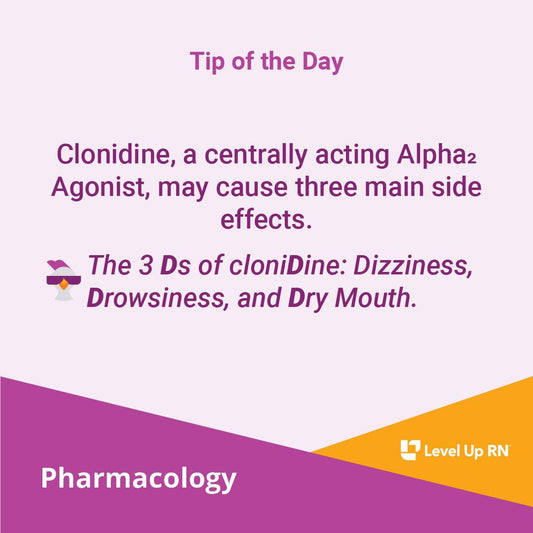Nursing Tips
Pharmacology (105)

US Drug Schedule
The US Drug Schedule is used to identify a substance's risk for abuse. The schedule uses categories I, II, III, IV, and V. Category I has the highest risk of...
US Drug Schedule
The US Drug Schedule is used to identify a substance's risk for abuse. The schedule uses categories I, II, III, IV, and V. Category I has the highest risk of...
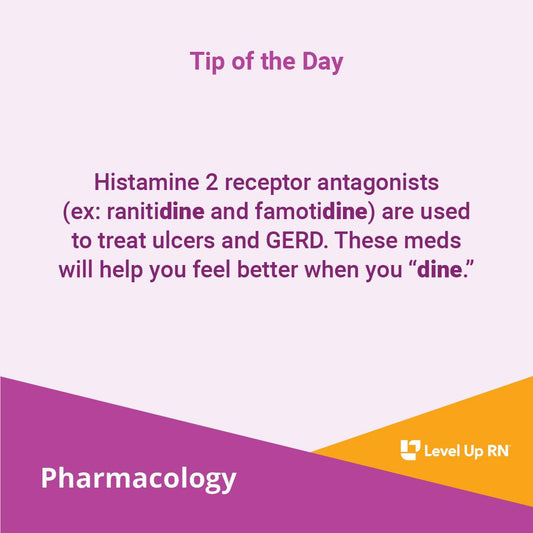
Histamine 2 Receptor Antagonists and DINE-ing
Histamine 2 receptor antagonists (ex: ranitidine and famotidine) are used to treat ulcers and GERD. These meds will help you feel better when you "dine".
Histamine 2 Receptor Antagonists and DINE-ing
Histamine 2 receptor antagonists (ex: ranitidine and famotidine) are used to treat ulcers and GERD. These meds will help you feel better when you "dine".

Colchicine
Colchicine is a medication used to treat an acute gout attack.
Colchicine
Colchicine is a medication used to treat an acute gout attack.
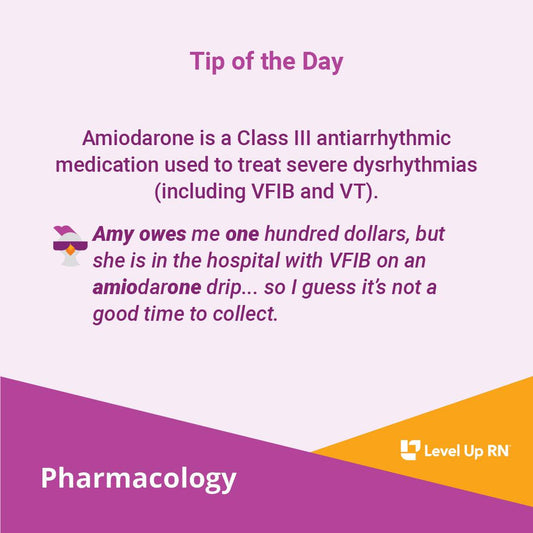
Amiodarone Drip
Amy owes me one hundred dollars, but she is in the hospital with VFIB on an amiodarone drip... so I guess it's not a good time to collect.
Amiodarone Drip
Amy owes me one hundred dollars, but she is in the hospital with VFIB on an amiodarone drip... so I guess it's not a good time to collect.
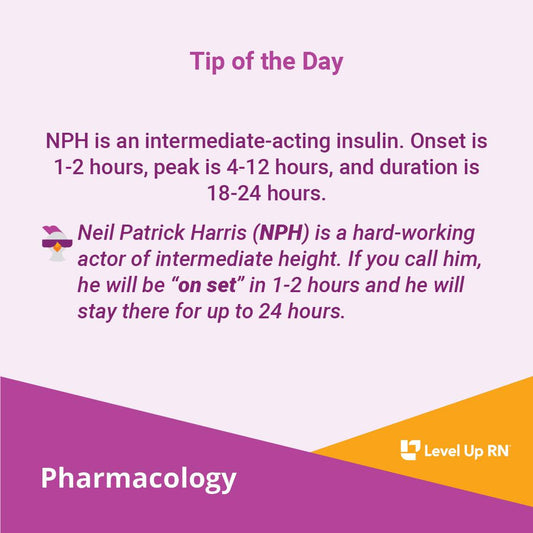
NPH- Intermediate-Acting Insulin
NPH is an intermediate-acting insulin. Onset is 1-2 hours, peak is 4-12 hours, and duration is 18-24 hours. HINT: Neil Patrick Harris (NPH) is a hard-working actor of intermediate height....
NPH- Intermediate-Acting Insulin
NPH is an intermediate-acting insulin. Onset is 1-2 hours, peak is 4-12 hours, and duration is 18-24 hours. HINT: Neil Patrick Harris (NPH) is a hard-working actor of intermediate height....

Albumin: Mode of Action
Albumin is used to maintain osmotic pressure in the plasma by drawing fluid into the vascular space.
Albumin: Mode of Action
Albumin is used to maintain osmotic pressure in the plasma by drawing fluid into the vascular space.

Clotrimazole
Clotrimazole is a medication often used to treat athlete's foot (tinea pedis).
Clotrimazole
Clotrimazole is a medication often used to treat athlete's foot (tinea pedis).

Primary use of Lactulose
Lactulose is a laxative, but it is primarily used to decrease AMMONIA levels in patients with hepatic encephalopathy.
Primary use of Lactulose
Lactulose is a laxative, but it is primarily used to decrease AMMONIA levels in patients with hepatic encephalopathy.

Scheduled Medications
In most states, scheduled medications (i.e., those with risk for abuse) cannot be called in over the phone, and refills are not permitted.
Scheduled Medications
In most states, scheduled medications (i.e., those with risk for abuse) cannot be called in over the phone, and refills are not permitted.

Tetracyclines: Patient Teaching
Educate patients taking tetracyclines that it is important to avoid dairy products, foods high in calcium and iron, and antacids, as these decrease the absorption of the antibiotic.
Tetracyclines: Patient Teaching
Educate patients taking tetracyclines that it is important to avoid dairy products, foods high in calcium and iron, and antacids, as these decrease the absorption of the antibiotic.

Tetracyclines
Tetracyclines (e.g., doxycycline) should not be used in pregnant/breastfeeding patients. Due to the risk for permanent tooth discoloration, it should also be avoided in children under 8 years old.
Tetracyclines
Tetracyclines (e.g., doxycycline) should not be used in pregnant/breastfeeding patients. Due to the risk for permanent tooth discoloration, it should also be avoided in children under 8 years old.

Albumin
Because albumin increases the fluid volume and osmotic pressure of the intravascular space, assess for signs of fluid overload, and be sure not to give this medication to a patient...
Albumin
Because albumin increases the fluid volume and osmotic pressure of the intravascular space, assess for signs of fluid overload, and be sure not to give this medication to a patient...

Time-critical scheduled medications
Time-critical scheduled medications (e.g., antibiotics) need to be given within 30 minutes before or after the scheduled time.
Time-critical scheduled medications
Time-critical scheduled medications (e.g., antibiotics) need to be given within 30 minutes before or after the scheduled time.

Clopidogrel
Clopidogrel, a platelet aggregate inhibitor, helps to prevent myocardial infarction and stroke in patients with acute coronary syndrome.
Clopidogrel
Clopidogrel, a platelet aggregate inhibitor, helps to prevent myocardial infarction and stroke in patients with acute coronary syndrome.

Proton Pump Inhibitors
Omeprazole and Pantoprazole are Proton Pump Inhibitors used to treat duodenal and gastric ulcers, GERD, and Zollinger-Ellison syndrome. HINT: I will take Omeprazole and pray my ulcer pain goes away....
Proton Pump Inhibitors
Omeprazole and Pantoprazole are Proton Pump Inhibitors used to treat duodenal and gastric ulcers, GERD, and Zollinger-Ellison syndrome. HINT: I will take Omeprazole and pray my ulcer pain goes away....

Hydroxychloroquine
Patients with rheumatoid arthritis, lupus, or malaria may require use of the medication hydroxychloroquine. Because this medication can cause agranulocytosis, monitor CBC levels during therapy.
Hydroxychloroquine
Patients with rheumatoid arthritis, lupus, or malaria may require use of the medication hydroxychloroquine. Because this medication can cause agranulocytosis, monitor CBC levels during therapy.

Sulfa Allergies
A patient who reports "sulfa" allergies should not be given sulfonamide antibiotics such as sulfamethoxazole.
Sulfa Allergies
A patient who reports "sulfa" allergies should not be given sulfonamide antibiotics such as sulfamethoxazole.

Anticholoinergic side effects
Good way to remember anticholinergic side effects: Can't see, can't pee, can't spit, can't s**t.
Anticholoinergic side effects
Good way to remember anticholinergic side effects: Can't see, can't pee, can't spit, can't s**t.

Sulfonylureas
Glipizide and glyburide are Sulfonylureas used to treat type 2 Diabetes. HINT: Think of riding down a slide, as your blood sugar comes down with this medication. Key side effect...
Sulfonylureas
Glipizide and glyburide are Sulfonylureas used to treat type 2 Diabetes. HINT: Think of riding down a slide, as your blood sugar comes down with this medication. Key side effect...

Proton Pump Inhibitors: Patient Teaching
Educate patients taking proton pump inhibitors (e.g., omeprazole, pantoprazole) to report watery diarrhea, as these medications can cause C. diff by decreasing stomach acid production.
Proton Pump Inhibitors: Patient Teaching
Educate patients taking proton pump inhibitors (e.g., omeprazole, pantoprazole) to report watery diarrhea, as these medications can cause C. diff by decreasing stomach acid production.

Central Venous Catheter (CVC)
A patient with a Central Venous Catheter (CVC) should have the dressing changed 24 hours after insertion and weekly thereafter (or per facility policy) using sterile technique.
Central Venous Catheter (CVC)
A patient with a Central Venous Catheter (CVC) should have the dressing changed 24 hours after insertion and weekly thereafter (or per facility policy) using sterile technique.

QD & Q.D.: Error-Prone Abbreviations
QD or Q.D. is an abbreviation meaning "daily." However, it is an error-prone abbreviation as it may be confused with QOD (every other day) or QID (four times a day). Instead,...
QD & Q.D.: Error-Prone Abbreviations
QD or Q.D. is an abbreviation meaning "daily." However, it is an error-prone abbreviation as it may be confused with QOD (every other day) or QID (four times a day). Instead,...

Bethanechol
Bethanechol, used to treat non-obstructive urinary retention, stimulates cholinergic receptors
Bethanechol
Bethanechol, used to treat non-obstructive urinary retention, stimulates cholinergic receptors

Atropine: Nursing Care
Because atropine has anticholinergic side effects, it is often administered during surgery to decrease secretions.
Atropine: Nursing Care
Because atropine has anticholinergic side effects, it is often administered during surgery to decrease secretions.

Ethambutol: Patient Teaching
A patient taking ethambutol for tuberculosis should be educated to have regular vision screenings and report changes in vision to the prescriber.
Ethambutol: Patient Teaching
A patient taking ethambutol for tuberculosis should be educated to have regular vision screenings and report changes in vision to the prescriber.

Spironolactone
Because spironolactone is a potassium-sparing diuretic, monitor the patient for signs of hyperkalemia. Educate patients to avoid salt substitutes, as most of these contain potassium.
Spironolactone
Because spironolactone is a potassium-sparing diuretic, monitor the patient for signs of hyperkalemia. Educate patients to avoid salt substitutes, as most of these contain potassium.

Filgrastim
Filgrastim is a medication used to stimulate the growth of neutrophils in patients with neutropenia.
Filgrastim
Filgrastim is a medication used to stimulate the growth of neutrophils in patients with neutropenia.

Oxybutynin
Because oxybutynin is used to treat overactive bladder by inhibiting acetylcholine in the bladder, assess for anticholinergic symptoms. These include dry mouth, urinary retention, constipation, and blurred vision.
Oxybutynin
Because oxybutynin is used to treat overactive bladder by inhibiting acetylcholine in the bladder, assess for anticholinergic symptoms. These include dry mouth, urinary retention, constipation, and blurred vision.

Corticosteroids: Patient Teaching
Patients taking corticosteroids (e.g., prednisone, hydrocortisone) are at increased risk of infection. Monitor for signs of infection, and educate patients taking these medications to avoid crowded areas and perform frequent...
Corticosteroids: Patient Teaching
Patients taking corticosteroids (e.g., prednisone, hydrocortisone) are at increased risk of infection. Monitor for signs of infection, and educate patients taking these medications to avoid crowded areas and perform frequent...

Metformin
Because of the unpleasant GI side effects of metformin, educate patients to take this medication with a meal.
Metformin
Because of the unpleasant GI side effects of metformin, educate patients to take this medication with a meal.

Digoxin and Hypokalemia
Because hypokalemia increases a patient's risk of digoxin toxicity, be sure to closely monitor the potassium levels for patients taking digoxin!
Digoxin and Hypokalemia
Because hypokalemia increases a patient's risk of digoxin toxicity, be sure to closely monitor the potassium levels for patients taking digoxin!

Atropine
Atropine is a medication that can be administered to patients with sinus bradycardia or heart block in order to increase heart rate.
Atropine
Atropine is a medication that can be administered to patients with sinus bradycardia or heart block in order to increase heart rate.

Ipratropium
Because ipratropium is an anticholinergic medication, educate patients that they should increase their fluid intake and suck on candy for dry mouth.
Ipratropium
Because ipratropium is an anticholinergic medication, educate patients that they should increase their fluid intake and suck on candy for dry mouth.

Acetylcysteine is Supposed to Smell Like Rotten Eggs
Acetylcysteine is a mucolytic used to treat pulmonary disorders with thick mucous secretions (e.g., cystic fibrosis). It is expected that this medication smells like rotten eggs; this is not an...
Acetylcysteine is Supposed to Smell Like Rotten Eggs
Acetylcysteine is a mucolytic used to treat pulmonary disorders with thick mucous secretions (e.g., cystic fibrosis). It is expected that this medication smells like rotten eggs; this is not an...

Acetylcysteine
Acetylcysteine, a respiratory medication, is also used as an antidote for acetaminophen toxicity!
Acetylcysteine
Acetylcysteine, a respiratory medication, is also used as an antidote for acetaminophen toxicity!

Oseltamivir
A patient taking oseltamivir to treat Influenza A and B must begin therapy within 48 hours of the onset of symptoms.
Oseltamivir
A patient taking oseltamivir to treat Influenza A and B must begin therapy within 48 hours of the onset of symptoms.

Acetaminophen: Patient Teaching
Acetaminophen, a non-opioid analgesic, can cause hepatotoxicity in high doses.
Acetaminophen: Patient Teaching
Acetaminophen, a non-opioid analgesic, can cause hepatotoxicity in high doses.

Iodism: Patient Teaching
A patient taking a strong iodine solution to treat hyperthyroidism or thyrotoxicosis in preparation for thyroidectomy should be educated as to the symptoms of iodism (e.g., metallic taste, stomatitis, severe...
Iodism: Patient Teaching
A patient taking a strong iodine solution to treat hyperthyroidism or thyrotoxicosis in preparation for thyroidectomy should be educated as to the symptoms of iodism (e.g., metallic taste, stomatitis, severe...
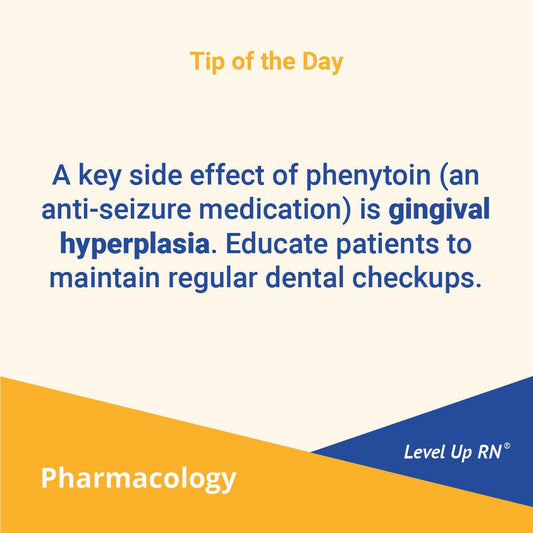
Phenytoin and Gingival Hyperplasia
A key side effect of phenytoin (an anti-seizure medication) is gingival hyperplasia. Educate patients to maintain regular dental checkups.
Phenytoin and Gingival Hyperplasia
A key side effect of phenytoin (an anti-seizure medication) is gingival hyperplasia. Educate patients to maintain regular dental checkups.
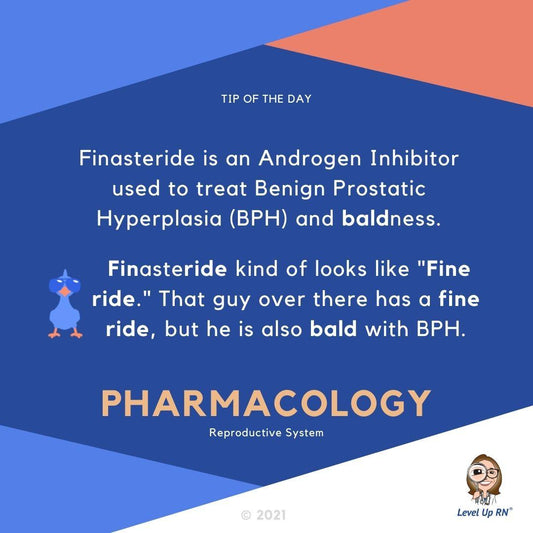
Finasteride
Finasteride is an Androgen Inhibitor used to treat Benign Prostatic Hyperplasia (BPH) and baldness.
Finasteride
Finasteride is an Androgen Inhibitor used to treat Benign Prostatic Hyperplasia (BPH) and baldness.
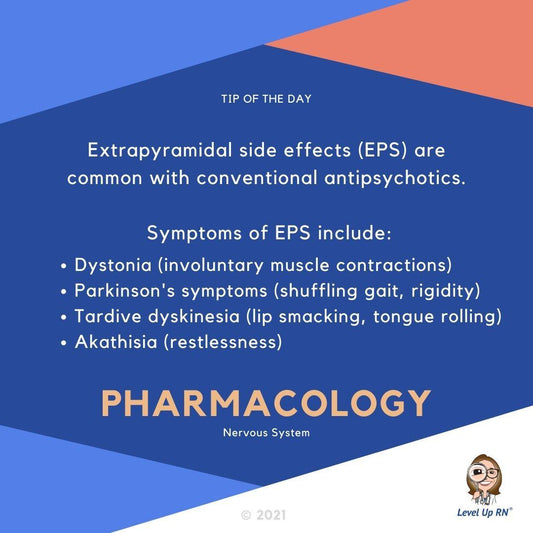
Extrapyramidal Side Effects
Extrapyramidal side effects (EPS) are common with Conventional Antipsychotics. Symptoms of EPS include: Dystonia, Parkinson's symptoms, Tardive dyskinesia, Akathisia.
Extrapyramidal Side Effects
Extrapyramidal side effects (EPS) are common with Conventional Antipsychotics. Symptoms of EPS include: Dystonia, Parkinson's symptoms, Tardive dyskinesia, Akathisia.
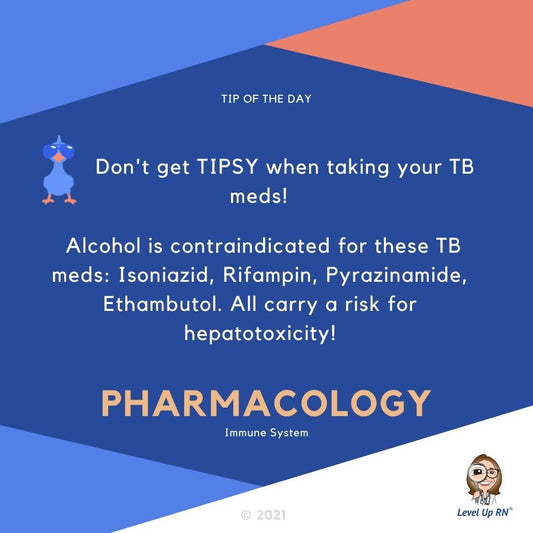
TB Meds
Don't get TIPSY when taking your TB meds! Alcohol is contraindicated for these TB meds: Isoniazid, Rifampin, Pyrazinamide, Ethambutol. All carry a risk for hepatotoxicity!
TB Meds
Don't get TIPSY when taking your TB meds! Alcohol is contraindicated for these TB meds: Isoniazid, Rifampin, Pyrazinamide, Ethambutol. All carry a risk for hepatotoxicity!
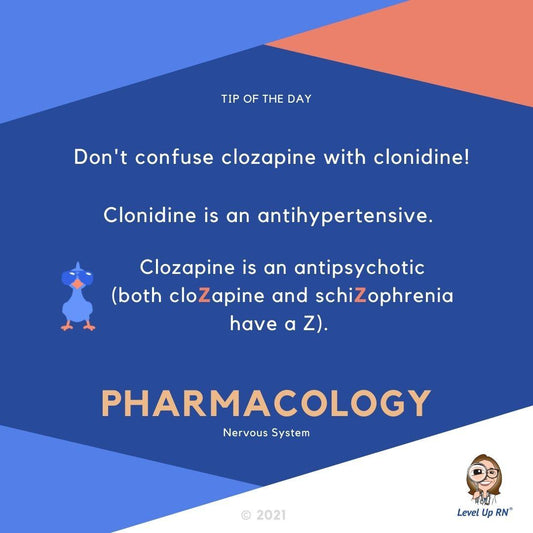
Clozapine vs. Clonidine
Don't confuse clozapine with clonidine! Clonidine is an antihypertensive. Clozapine is an antipsychotic.
Clozapine vs. Clonidine
Don't confuse clozapine with clonidine! Clonidine is an antihypertensive. Clozapine is an antipsychotic.
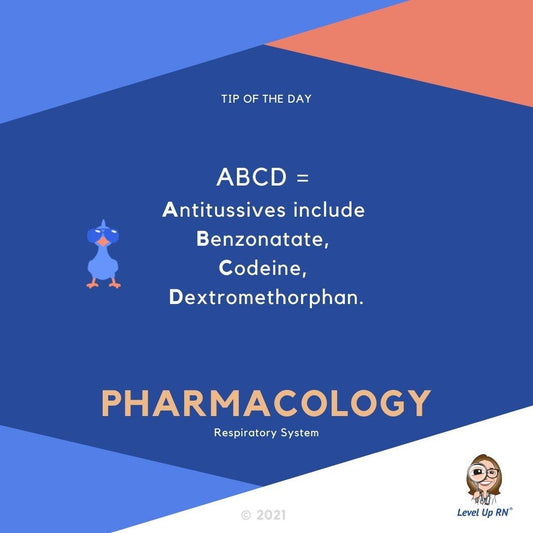
Antitussives ABCD Tip
ABCD = Antitussives include Benzonatate, Codeine, Dextromethorphan.
Antitussives ABCD Tip
ABCD = Antitussives include Benzonatate, Codeine, Dextromethorphan.

Ciprofloxacin
Ciprofloxacin is a fluoroquinolone antibiotic used to treat UTIs. A unique side effect of this medication is "achilles tendon rupture". HINT: If you take CIPRO, you might SLIP due to...
Ciprofloxacin
Ciprofloxacin is a fluoroquinolone antibiotic used to treat UTIs. A unique side effect of this medication is "achilles tendon rupture". HINT: If you take CIPRO, you might SLIP due to...
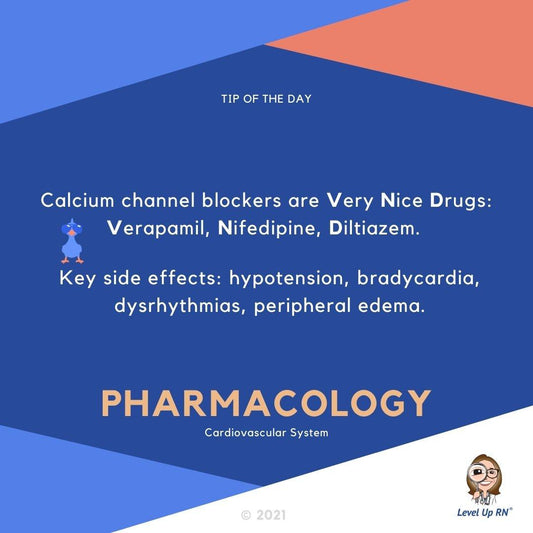
Calcium Channel Blockers
Calcium channel blockers are Very Nice Drugs: Verapamil, Nifedipine, Diltiazem.
Calcium Channel Blockers
Calcium channel blockers are Very Nice Drugs: Verapamil, Nifedipine, Diltiazem.
Filter Articles
Shop
The Ultimate Nursing School Survival Kit - with Flashables and Membership
4.875 / 5.0
(240) 240 total reviews
Regular price $349.95Regular priceUnit price / per$817.95Sale price $349.95SaleVideos by Subject
Tips & More
Exam Information
Subscribe

